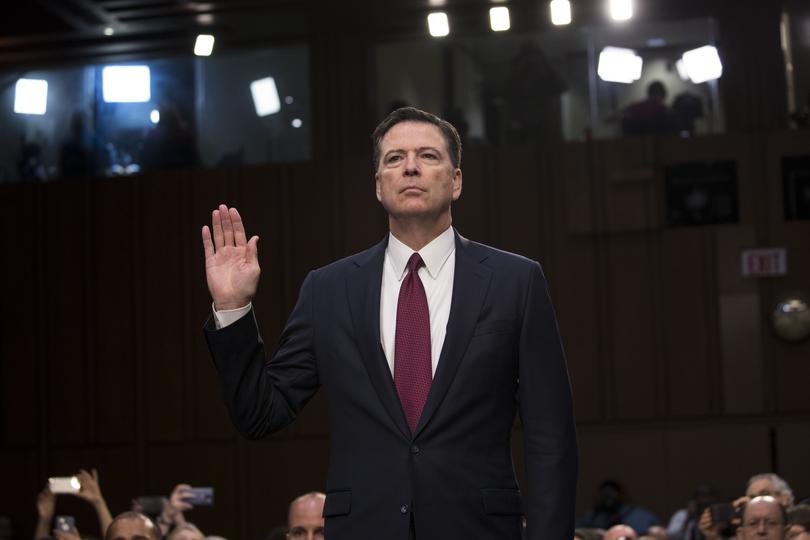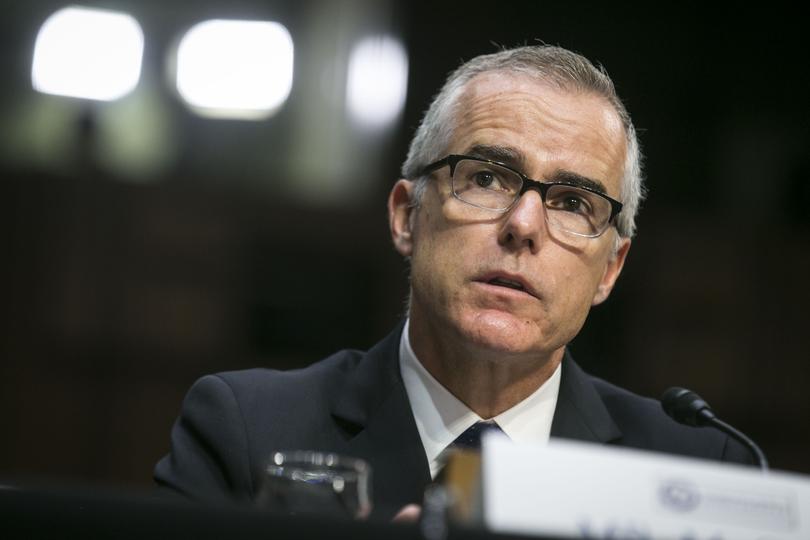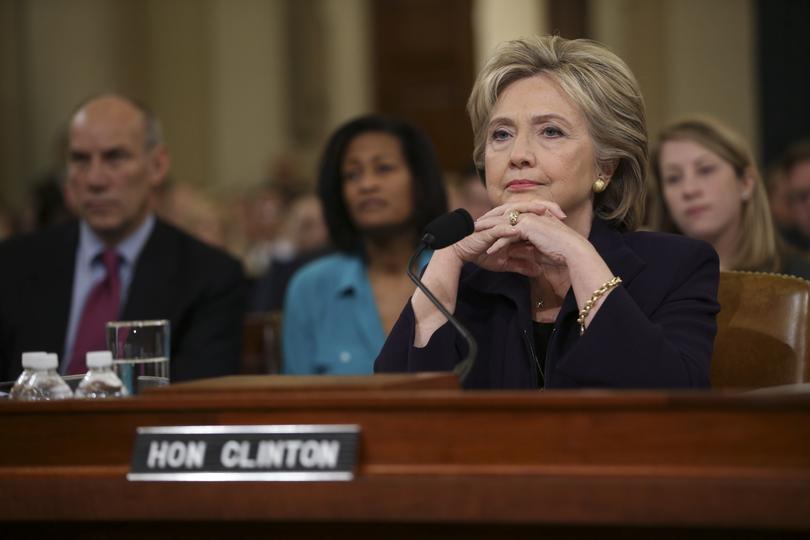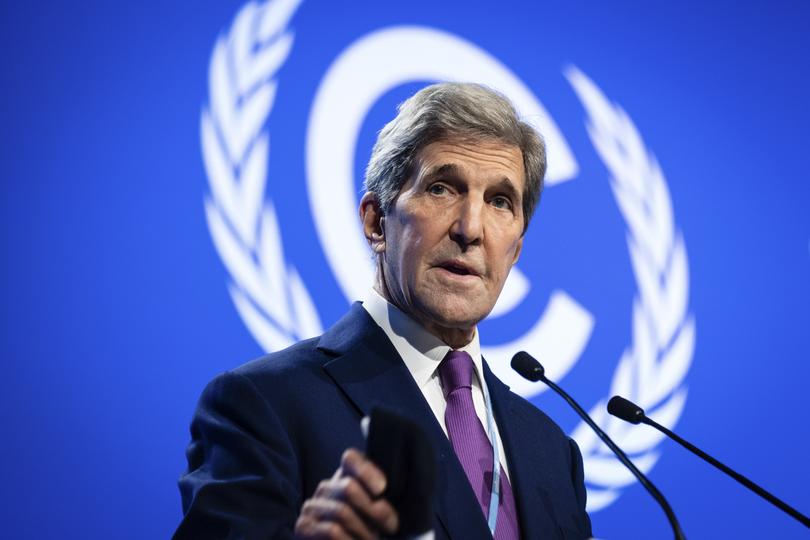THE NEW YORK TIMES: Keeping score on Donald Trump’s score settling
As President, Donald Trump frequently demanded investigations of his foes. He often got his way.
Former President Donald Trump and his allies have suggested that his constant threats to prosecute rivals and perceived enemies if he is elected again should not be taken literally.
“His vengeance is going to be by winning and making America great again, not going after his political opponents,” Sen. Marco Rubio, R-Fla., told CNN.
But as president, Trump tried repeatedly to use the powers of the federal government to investigate or penalise foes.
Sign up to The Nightly's newsletters.
Get the first look at the digital newspaper, curated daily stories and breaking headlines delivered to your inbox.
By continuing you agree to our Terms and Privacy Policy.While a few of them had engaged in conduct that made them legitimate targets of inquiry, there was no legal basis for many.
None were ultimately put behind bars, but they had to fend off criminal investigations, civil suits brought by the Justice Department and other forms of government pressure.
The decisions to pursue Trump’s rivals cannot always be traced back to a direct, formal order from him, but they are consistent with public or private pressure he exerted. Here are some of the more prominent examples from his time in office.

JAMES COMEY
FBI director
What they did that Trump did not like: Declined to recommend prosecuting Hillary Clinton, opened the Russia investigation, refused a loyalty pledge to Trump and bucked pressure to drop an investigation into Trump’s national security adviser. Kept and later disclosed contemporaneous memos about his private meetings with Trump that raised questions about whether he obstructed justice, leading to the appointment of a special counsel, Robert Mueller.
What Trump wanted done: Trump publicly called Comey a traitor and pressed for him to be investigated and prosecuted for: being a leaker, disclosing classified information and mishandling the Clinton and Russia investigations. Privately, Trump pressured the Justice Department and the attorney general to investigate and prosecute Comey, saying he would prosecute Comey himself if the attorney general refused. Trump told his White House chief of staff he wanted to “get the IRS” on Comey.
What happened: The Justice Department conducted a criminal investigation into whether Comey leaked classified information. Federal prosecutors and a special counsel appointed by Trump’s attorney general examined whether he mishandled the Clinton and Russia investigations. The IRS conducted a highly unusual and invasive audit into Comey’s finances.
Consequences: Comey was never charged criminally, and the IRS audit found he overpaid his taxes. Comey paid tens of thousands of dollars in legal and accounting fees to deal with the investigations and audit. The IRS inspector general investigated how the audit had come about but did not find evidence of political meddling.

ANDREW McCABE
Deputy FBI director
What they did that Trump did not like: While McCabe was serving as Comey’s deputy, his wife ran as a Democrat for a state Senate seat in Virginia and took money from a Clinton ally. After Trump fired Comey, McCabe opened a two-pronged investigation into whether Trump was a counterintelligence threat and was obstructing justice. McCabe also made statements to internal Justice Department and FBI investigators that later were suspected to be false.
What Trump wanted done: Trump called McCabe a traitor and asked for him to be investigated and prosecuted for a range of matters, including whether he lied to the internal FBI and Justice Department investigators. Trump said he wanted to “get the IRS” on McCabe and wanted him fired.
What happened: The Justice Department conducted a criminal investigation into whether McCabe lied to the FBI and the Justice Department, and McCabe was examined as a leaker. Federal prosecutors and a special counsel appointed by Trump’s attorney general examined his handling of the Clinton and Russia investigations. The IRS conducted the same highly unusual and invasive audit that Comey was subjected to.
Consequences: Prosecutors sought an indictment, but the grand jury declined to charge him. Amid pressure from Trump, Attorney General Jeff Sessions fired McCabe just days before his retirement, depriving him of his pension and benefits. The Biden Justice Department essentially rescinded the firing and returned his benefits. McCabe spent over $1 million to defend the criminal investigation and tens of thousands for the audit. The IRS inspector general found no evidence that the audit came about through political interference.
PETER STRZOK
Lead FBI agent on Clinton and Russia investigations
What they did that Trump did not like: As the lead agent on the Clinton and Russia investigations, Strzok exchanged text messages with an FBI aide that were highly critical of Trump. He interviewed Trump’s national security adviser, Michael Flynn, at the White House, early in the Trump presidency. Flynn lied about his contacts with Russian officials, leading to his dismissal and ultimate prosecution. Working with McCabe, Strzok opened the two-pronged investigation into whether Trump was a counterintelligence threat and was obstructing justice.
What Trump wanted done: Trump called Strzok a traitor and said he should be criminally investigated for his handling of the Russia investigation. Publicly and privately, Trump pushed to have him fired and told top aides that he wanted the IRS to investigate him.
What happened: The FBI fired Strzok. Federal prosecutors and a special counsel investigated Strzok’s handling of the Clinton and Russia investigations. Prosecutors also examined his interview of Flynn, which ultimately led to charges against Flynn being thrown out.
Consequences: Because of his dismissal, Strzok lost benefits and his pension. He racked up over $1 million in legal fees dealing with various investigations and in filing a lawsuit against the Justice Department and the FBI that sought to have his job reinstated and to regain his benefits and pension.
JOHN BOLTON
Trump’s national security adviser
What they did that Trump did not like: Bolton wrote a highly unflattering book about Trump published during the 2020 election.
What Trump wanted done: Trump sought to stop publication of the book.
What happened: The Justice Department filed suit, asking a federal judge to take the extraordinary step of halting the publication on the grounds that Bolton had failed to complete a prepublication review for classified material. The department also sought to use the suit to recoup profits Bolton made from the book. The department also opened a criminal investigation into whether Bolton mishandled classified information as part of the publication of the book, subpoenaing Bolton’s publisher.
Consequences: A federal judge refused to halt the publication. Bolton was never charged with mishandling classified information. The Biden Justice Department dropped the suit to recoup the book’s profits. The matter cost Bolton and his publisher hundreds of thousands of dollars in legal fees.

HILLARY CLINTON
Trump’s 2016 campaign opponent
What they did that Trump did not like: Trump had sought to portray Clinton as corrupt throughout the 2016 presidential campaign, focusing on, among other things, donations to the Clinton Foundation and her use of a private email server and her deletion of messages from it. As his own legal issues intensified after taking office, he sought to deflect attention to what he cast as her criminality.
What Trump wanted done: Trump publicly called for her and her campaign to be criminally prosecuted on several issues. Privately, he pressured Sessions to investigate and prosecute Clinton and told the White House’s top lawyer that if Sessions refused to prosecute Clinton, he would do it himself.
What happened: Federal prosecutors and a special counsel examined nearly all the issues and conspiracy theories Trump raised about Clinton, her campaign and the Clinton Foundation, including the Clinton campaign’s role in gathering information during the 2016 campaign about ties between Trump’s associates and Russia and providing it to the FBI.
Consequences: A lawyer for the Clinton campaign was indicted, and later acquitted, on a charge of making false statements to the FBI about Trump’s ties to Russia. Clinton sat for questioning with special counsel John Durham, answering a litany of questions about an array of issues and conspiracies Trump had pushed about the Clintons. She was never charged with anything.

JOHN KERRY
Secretary of state during the Obama administration
What they did that Trump did not like: Kerry helped negotiate the nuclear deal with Iran while serving under President Barack Obama. After leaving office, he publicly criticized Trump for wanting to pull out of the deal, and he maintained some contacts with Iranian diplomats.
What Trump wanted done: Trump publicly and privately raised questions about whether Kerry was breaking the law by continuing to remain in contact with Iranian officials after leaving office. Trump told top aides and the attorney general that Kerry should be prosecuted.
What happened: Immediately after Trump started raising questions publicly about Kerry, Justice Department officials in Washington told prosecutors for the US Attorney’s Office for the Southern District of New York that they were referring to them an investigation related to Kerry’s contacts with Iran. A year later, after Trump again publicly attacked Kerry, a top Justice Department official in Washington called the US attorney’s office in New York to find out why the office was delaying taking an investigative step to look at Kerry’s personal communications.
Consequences: The US attorney’s office in New York declined to prosecute Kerry. But the Justice Department under Trump did not give up on trying to bring charges. Attorney General William Barr took the case to the US Attorney’s Office in Maryland, where the top prosecutor there came to the same conclusion as the federal prosecutors in New York and declined to charge Kerry.
MICHAEL COHEN
Trump’s former lawyer and fixer
What they did that Trump did not like: Cohen turned against Trump in a federal investigation, saying the president directed him to make hush money payments to a porn actress in the final days of the 2016 campaign.
What Trump wanted done: After Cohen pleaded guilty to federal charges connected to the hush money payments and was sentenced to a prison term, Trump privately discussed with aides ways of trying to stop publication of a book Cohen was writing.
What happened: During the pandemic, Cohen, like many inmates, was allowed to serve his sentence at home. While at home, Bureau of Prisons officials told him that in order to remain out of prison he had to sign an agreement saying that he would not publish a book while still serving his sentence.
Consequences: Cohen refused to sign the agreement and was thrown back in prison. Days later, a federal judge freed him, ruling that the decision to put him back behind bars amounted to retaliation. “It’s retaliatory because of his desire to exercise his First Amendment rights to publish a book and to discuss anything about the book or anything else he wants on social media and with others,” the judge said, adding that the judge had never seen the federal government try to reach such an agreement with a convict.
NEWS ORGANISATIONS
CNN, The Washington Post and The New York Times
What they did that Trump did not like: Journalists from all three organisations covered his presidency and the Russia investigation aggressively and used material that Trump felt had been leaked to hurt him.
What Trump wanted done: Trump publicly called the media the enemy of the people and repeatedly pushed aides to use the Justice Department to go after reporters who were writing damaging and embarrassing stories about him. He told the White House’s top lawyer to tell the attorney general to “arrest reporters, force them to serve time in jail, and then demand they disclose their sources,” according to Bolton’s book, which added that the White House counsel agreed to relay Trump’s request to the attorney general.
What happened: As part of leak investigations, the Justice Department obtained phone and email records for reporters for CNN, The Washington Post and The New York Times.
Consequences: Lawyers for the media companies were forced to secretly fight the Justice Department to stop them from obtaining the records. The Biden administration subsequently banned the use of subpoenas, warrants or court orders to seize reporters’ communications records or demand their notes or testimony in an effort to uncover confidential sources in leak investigations.
This article originally appeared in The New York Times.
© 2024 The New York Times Company
Originally published on The New York Times
